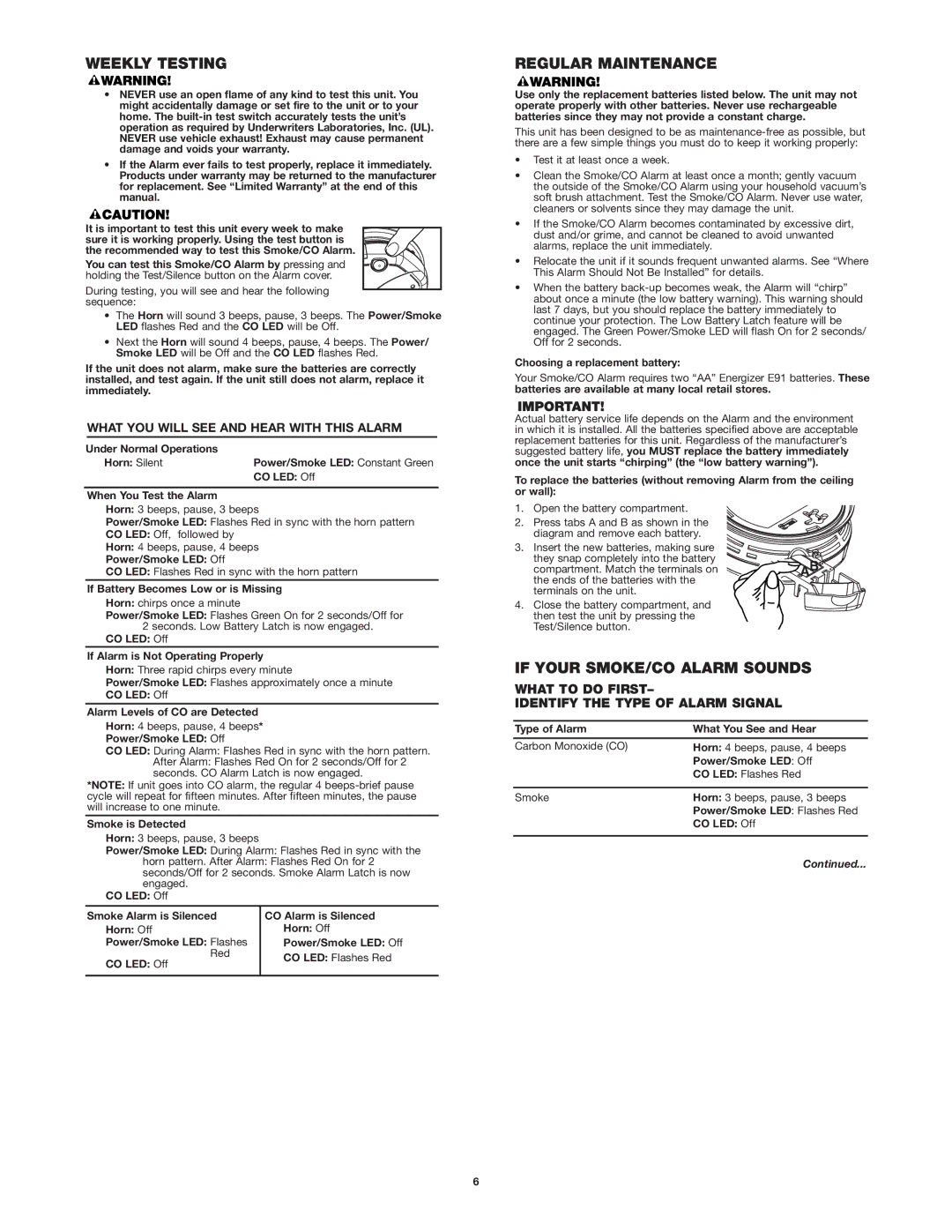WEEKLY TESTING
•NEVER use an open flame of any kind to test this unit. You might accidentally damage or set fire to the unit or to your home. The built-in test switch accurately tests the unit’s operation as required by Underwriters Laboratories, Inc. (UL). NEVER use vehicle exhaust! Exhaust may cause permanent damage and voids your warranty.
•If the Alarm ever fails to test properly, replace it immediately. Products under warranty may be returned to the manufacturer for replacement. See “Limited Warranty” at the end of this manual.
It is important to test this unit every week to make sure it is working properly. Using the test button is the recommended way to test this Smoke/CO Alarm.
You can test this Smoke/CO Alarm by pressing and holding the Test/Silence button on the Alarm cover.
During testing, you will see and hear the following sequence:
•The Horn will sound 3 beeps, pause, 3 beeps. The Power/Smoke LED flashes Red and the CO LED will be Off.
•Next the Horn will sound 4 beeps, pause, 4 beeps. The Power/ Smoke LED will be Off and the CO LED flashes Red.
If the unit does not alarm, make sure the batteries are correctly installed, and test again. If the unit still does not alarm, replace it immediately.
WHAT YOU WILL SEE AND HEAR WITH THIS ALARM
Under Normal Operations | |
Horn: Silent | Power/Smoke LED: Constant Green |
| CO LED: Off |
When You Test the Alarm
Horn: 3 beeps, pause, 3 beeps
Power/Smoke LED: Flashes Red in sync with the horn pattern
CO LED: Off, followed by
Horn: 4 beeps, pause, 4 beeps
Power/Smoke LED: Off
CO LED: Flashes Red in sync with the horn pattern
If Battery Becomes Low or is Missing
Horn: chirps once a minute
Power/Smoke LED: Flashes Green On for 2 seconds/Off for 2 seconds. Low Battery Latch is now engaged.
CO LED: Off
If Alarm is Not Operating Properly
Horn: Three rapid chirps every minute
Power/Smoke LED: Flashes approximately once a minute
CO LED: Off
Alarm Levels of CO are Detected
Horn: 4 beeps, pause, 4 beeps*
Power/Smoke LED: Off
CO LED: During Alarm: Flashes Red in sync with the horn pattern. After Alarm: Flashes Red On for 2 seconds/Off for 2 seconds. CO Alarm Latch is now engaged.
*NOTE: If unit goes into CO alarm, the regular 4 beeps-brief pause cycle will repeat for fifteen minutes. After fifteen minutes, the pause will increase to one minute.
Smoke is Detected
Horn: 3 beeps, pause, 3 beeps
Power/Smoke LED: During Alarm: Flashes Red in sync with the horn pattern. After Alarm: Flashes Red On for 2 seconds/Off for 2 seconds. Smoke Alarm Latch is now engaged.
CO LED: Off
| Smoke Alarm is Silenced | CO Alarm is Silenced |
| Horn: Off | Horn: Off |
| Power/Smoke LED: Flashes | Power/Smoke LED: Off |
| Red | CO LED: Flashes Red |
| CO LED: Off |
| |
| | |
REGULAR MAINTENANCE
Use only the replacement batteries listed below. The unit may not operate properly with other batteries. Never use rechargeable batteries since they may not provide a constant charge.
This unit has been designed to be as maintenance-free as possible, but there are a few simple things you must do to keep it working properly:
•Test it at least once a week.
•Clean the Smoke/CO Alarm at least once a month; gently vacuum the outside of the Smoke/CO Alarm using your household vacuum’s soft brush attachment. Test the Smoke/CO Alarm. Never use water, cleaners or solvents since they may damage the unit.
•If the Smoke/CO Alarm becomes contaminated by excessive dirt, dust and/or grime, and cannot be cleaned to avoid unwanted alarms, replace the unit immediately.
•Relocate the unit if it sounds frequent unwanted alarms. See “Where This Alarm Should Not Be Installed” for details.
•When the battery back-up becomes weak, the Alarm will “chirp” about once a minute (the low battery warning). This warning should last 7 days, but you should replace the battery immediately to continue your protection. The Low Battery Latch feature will be engaged. The Green Power/Smoke LED will flash On for 2 seconds/ Off for 2 seconds.
Choosing a replacement battery:
Your Smoke/CO Alarm requires two “AA” Energizer E91 batteries. These batteries are available at many local retail stores.
Actual battery service life depends on the Alarm and the environment in which it is installed. All the batteries specified above are acceptable replacement batteries for this unit. Regardless of the manufacturer’s suggested battery life, you MUST replace the battery immediately once the unit starts “chirping” (the “low battery warning”).
To replace the batteries (without removing Alarm from the ceiling or wall):
1. Open the battery compartment.
2. Press tabs A and B as shown in the diagram and remove each battery.
3. Insert the new batteries, making sure | |
they snap completely into the battery | AB |
compartment. Match the terminals on |
the ends of the batteries with the | |
terminals on the unit. | |
4. Close the battery compartment, and then test the unit by pressing the Test/Silence button.
IF YOUR SMOKE/CO ALARM SOUNDS
WHAT TO DO FIRST–
IDENTIFY THE TYPE OF ALARM SIGNAL
Type of Alarm | What You See and Hear |
Carbon Monoxide (CO) | Horn: 4 beeps, pause, 4 beeps |
| Power/Smoke LED: Off |
| CO LED: Flashes Red |
| |
Smoke | Horn: 3 beeps, pause, 3 beeps |
| Power/Smoke LED: Flashes Red |
| CO LED: Off |
| |
| Continued... |

